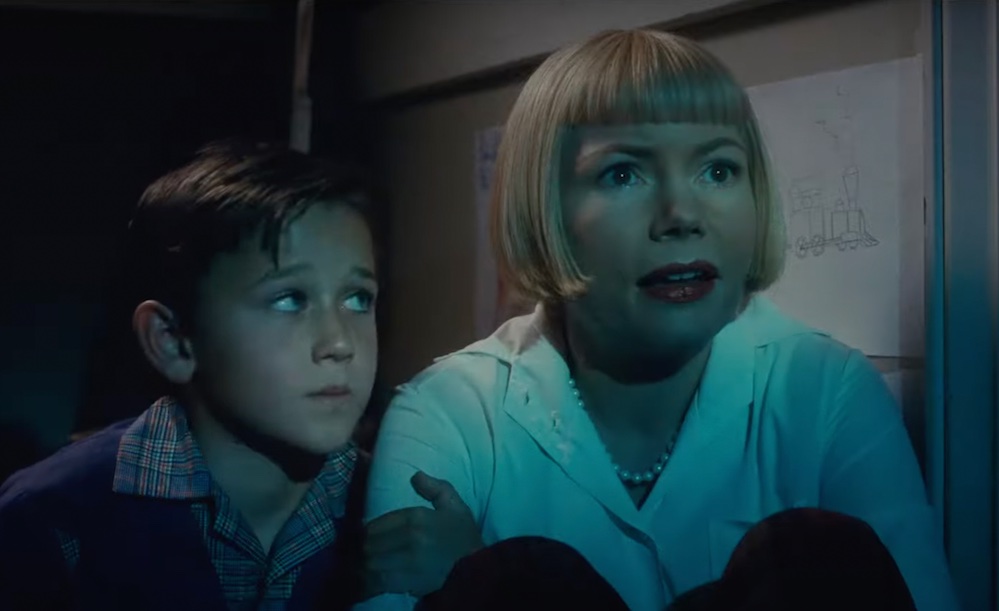A loose – but not too loose – autobiography, The Fabelmans is Spielberg looking back on his childhood through a lens colored by 75 years of life and nearly 50 years of being the biggest name filmmakers of all time. We’ve seen these kinds of films a lot lately, whether it’s Belfast, Armageddon Time, or the upcoming Empire of Light. None of these, however, take the same approach as Spielberg does. Instead of making some mawkish melodrama about The Importance of Cinema or wearing rose colored glasses towards his upbringing, he instead approaches it with a sense of knowing distance.

The story is centered around the first twenty or so years of Spielberg’s life, or should I say Sam Fabelman’s life. It follows Sam (Gabriel LaBelle) across the country, first in New Jersey as a young child first discovering a love of movies, then to Phoenix, Arizona where he first honed his craft as a precocious teenager, and finally to California where he would eventually become the biggest name in Hollywood. The massive amounts of travel was due to his father’s (Paul Dano) burgeoning career as a computer engineer, which causes conflict with his pianist mother (Michelle Williams).
There’s a reason the two classic films Spielberg specifically references in Sam’s upbringing are The Greatest Show on Earth and The Man Who Shot Liberty Valance. The former ties into Spielberg’s constant desire to be a showman, to use his filmmaking talent to entertain the most people possible. It’s what inspired Jurassic Park, Jaws, and E.T. and his countless populist films over his five decades as a director. The latter, however, is spotlighted not just because of Spielberg’s love of John Ford – which becomes very important later – but mostly because of Spielberg’s own desire to “print the legend.”

It’s something he does throughout The Fabelmans. Whether it’s Spielberg’s filmmaking skills inspiring his high school bully to become his friend or simply his ability to recreate a Cecil B Demille action sequence as a twelve year old, he’s more interested in “printing the legend” of Spielberg than doing something merely autobiographical. He’s not afraid of how corny it is or how unrealistic it is. Spielberg is using his clout to make a film about the legend of himself.
But this isn’t merely a masturbatory session of self-aggrandizement. There’s an interesting through-line of self-criticism involved that The Fabelmans doesn’t shy away from. There’s some of Spielberg’s most impressionistic filmmaking on display in this film. Scenes where you see Sam disassociate from his own body during important moments of his life to contemplate how he would be filming the scene if it were one of his movies. He sits away from the rest of his family as his parents announce their divorce to his sisters in order to think about how he would block and light the “scene”. There’s a cynicism here that’s surprising given the subject matter, as Spielberg grapples with his own exploitation of family tragedy for his art’s sake.

For a film marketed as Spielberg’s love letter to his own life and to the art form of cinema, The Fabelmans a shockingly rich text. That material is in there for sure – the Cinema Paradiso shot of a slack jawed child watching a movie backlit by the projector is here, of course – but it’s much more personal and complex than that. Spielberg’s films have often grappled with his complicated childhood as thematic subtext, whether it’s the depiction of fatherhood in Close Encounters of the Third Kind or the aftermath of divorce in E.T. Here he’s directly addressing it, initially setting up the film as a battle between his artistic mother and his engineer father for the soul of a young artist. It’s right there in the opening scene, where a young Sam is having movies explained to him – first by his father in a very technical manner and then by his mother who tells him in imaginative terms. The truth, though, turns out to be that his feelings are more complicated, as over the course of the film Sam realizes that his father is much more of an influence on his filmmaking techniques and his mother’s influence is knottier than simply that of a misunderstood artist.
It all ends with Spielberg’s famous story of meeting John Ford while starting out in the industry. Ford, one of the greatest filmmakers of all time and clearly the director that Spielberg was most inspired by (give or take a Frank Capra), was curt in his meeting but left Spielberg with critical advice. He told him that a painting with the horizon in the center of the frame was boring, and that the horizon needs to be either in the top or bottom of the frame. The Fabelmans is exactly that, ignoring the basic, simple story for something far more interesting above and below the middle. Given how overdone and, frankly, boring the “movie about how important movies are” genre has become over the past decade and a half or so, this is a perfect antidote.







